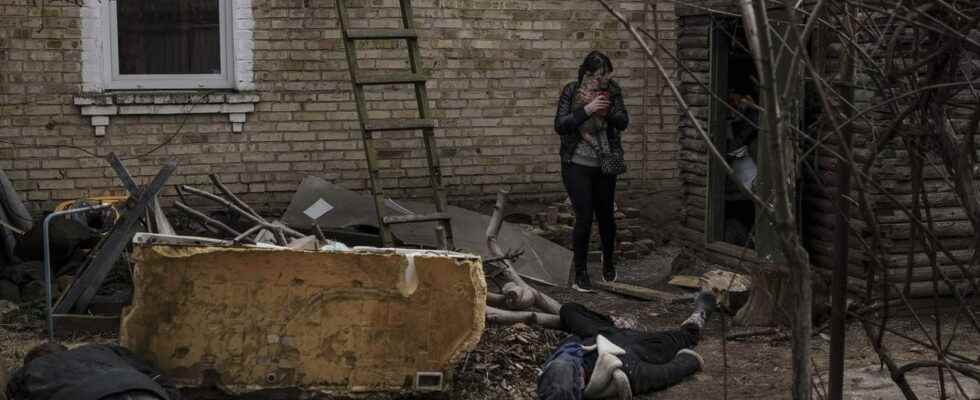UKRAINE. New bodies of civilians were discovered in Boutcha, near kyiv, after the Russians left. As the Kremlin denies the responsibility of its army, a space technology company reveals satellite images. Volodymyr Zelensky spoke to the UN.
Volodymyr Zelensky before the UN
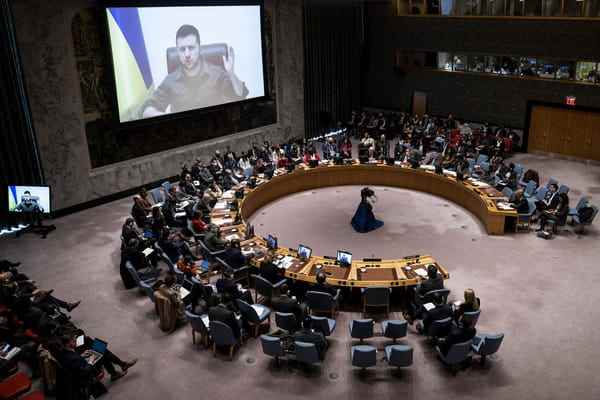
April 5 at 5:36 p.m. As the bombardments continue in southern and eastern Ukraine, Ukrainian President Volodymyr Zelensky spoke on Tuesday 5 April before the UN Security Council, meeting in New York, after the global shock wave caused by the discovery of numerous corpses of civilians in the city of Boutcha, where Ukraine accuses Russia of massacre. The Ukrainian president returned to the various abuses committed in Boutcha: “The Russians committed summary executions there, shot women, tortured, all for pleasure”. He described “civilians being tortured and killed at point-blank range in the streets”, others “had their tongues torn out”, “parents saw their children die, parents were killed in front of their children”, he said. – he added, still before the UN Security Council. “Mass massacres have become the signature of the Russians”, lamented Volodymyr Zelensky, considering that “the worst crimes since the end of the Second World War”.
The Ukrainian president directly attacked the UN Security Council: “Where is the Security Council, where is the peace in the name of which the UN was created? This organization is supposed to fulfill its function, stop the aggressors” he launched, “The UN today authorizes this aggressor to propagate death” he added. Volodymyr Zelensky has called on UN members to hold Russia “responsible” for “war crimes” in Ukraine.
French justice opens three investigations for “war crimes” in Ukraine
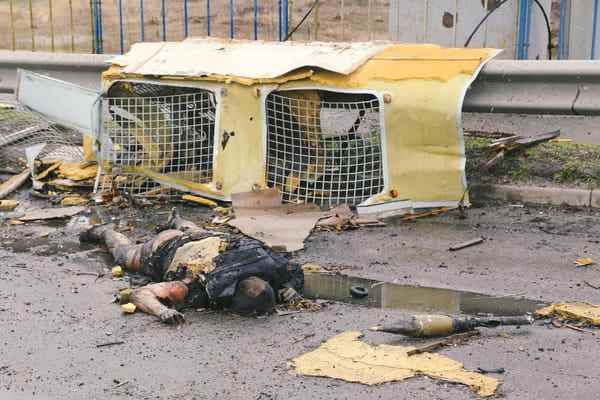
April 5 at 3:02 p.m. As war continues to rage in Ukraine and the shock wave of the Boutcha massacre continues to shake the world. This Tuesday, the French National Anti-Terrorist Prosecutor’s Office (PNAT) announced the opening of three new investigations for “war crimes”. The facts referred to have allegedly been committed against French nationals in Ukraine, since the invasion by Russia. They took place in Mariupol, in the south of Ukraine between February 25 and March 16, in Gostomel, in the kyiv region between March 1 and 12 and Cherniguiv, in the north of the country, from March 24 February, said the PNAT. An investigation had already opened after the death of Pierre Zakrzewski, a Franco-Irish journalist, on March 14 near the Ukrainian capital.
The PNAT specifies that in application of the legal provisions, the jurisdiction of the French courts may be retained if war crimes have been committed outside the national territory by a French perpetrator, to the detriment of a French victim or by a perpetrator having his habitual residence in the national territory.
Massacre of civilians in Boutcha: satellite images contradict the Russian version
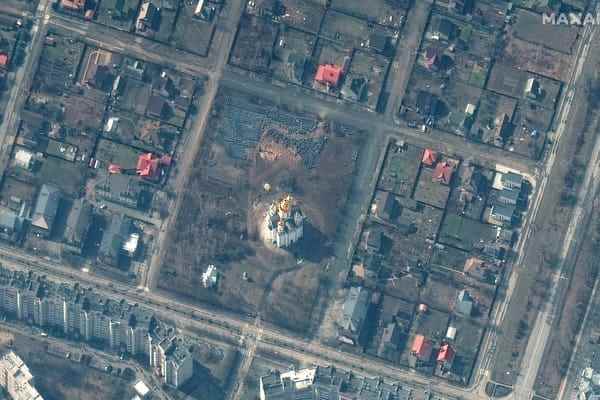
April 5 at 11:21 a.m. Monday evening, the American daily New York Times gives new information on the war in Ukraine and the massacre of Boutcha. The newspaper published an investigation, based on the analysis of satellite photos provided by the space imaging company Maxar, which refutes Russian claims that the killing of civilians in Bucha, in the Kyiv region, s happened after his Russian soldiers left the city. The images date from February 28, the first day of the war in Ukraine, and March 19, in full Russian offensive in Ukraine. To confirm that these are indeed civilian bodies and their date of appearance, the Times visual investigations team carried out a before and after analysis of satellite images. The images show dark objects, similar in size to a human body, appearing on a street between March 9 and March 11. Further analysis shows that they remained in these positions for more than three weeks, until they were discovered by Ukrainian forces, when they recaptured the town. Satellite images show at least 11 bodies have been on the streets since March 11, when Russia occupied the city. In addition, a video filmed by a member of the local council of the city on April 1 shows these same bodies and the few locals who remained in the city testify to the ordeal experienced during this occupation.
The Russian Ministry of Defense said in a statement that the images of corpses in the streets of the Ukrainian city were “a new production of the kyiv regime for the Western media”. Faced with these new revelations, Russia claimed, this time, that the satellite images are “another hoax” and called for an emergency meeting of the UN Security Council on what it called “provocations by Ukrainian radicals” in Boutcha.
Volodymyr Zelensky visiting Boutcha
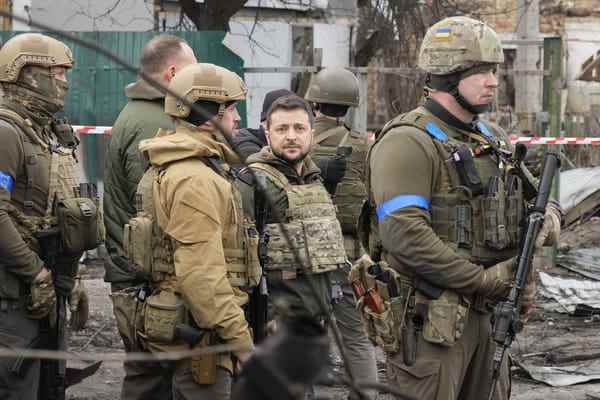
April 4 at 5:08 p.m.. The Ukrainian President, Volodymyr Zelensky, went, in a bulletproof vest and accompanied by Ukrainian soldiers, in a street of Boutcha devastated by the fighting, this Monday, April 4, after the discovery of several hundred bodies of civilians by the Ukrainian troops and the international community, in the kyiv region and in particular in Boutcha, on Sunday. He said: “These are war crimes. And this will be recognized by the world as genocide.” “Every day, when our fighters enter and retake territories, you see what is happening,” he added to the media. Boutcha, 37,000 inhabitants before the war, has been the scene of fighting since the start of the invasion of Ukraine on February 24. The city was occupied by the Russian army from February 27, remaining inaccessible for more than a month. The shelling there ceased on Thursday.
The Ukrainian president spoke with residents and visited the bruised city. Asked about the continuation of peace negotiations with Moscow, he replied that he was continuing his “diplomatic and military” efforts but that it had become more difficult for Ukraine to negotiate with Russia as it became aware of the atrocities committed by Russian forces on its territory. Russia rejects accusations that its military was responsible for the deaths. On Sunday, the Ukrainian president castigated the Russian troops, made up according to him of “murderers, torturers, rapists, looters”, after the massacre of civilians uncovered in Boutcha.
Emmanuel Macron calls for new sanctions and Western countries speak of “genocide” in Boutcha
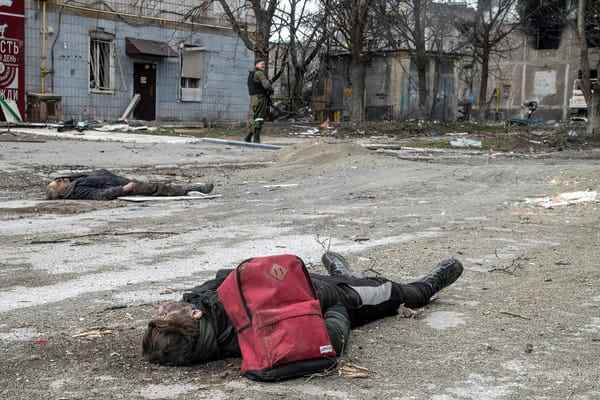
April 4 at 11:25 a.m. On this 40th day of conflict, and after the discovery of several hundred bodies of civilians by Ukrainian troops and the international community, in the kyiv region and in particular in Boucha, Emmanuel Macron called this morning for new sanctions against Russia, particularly on coal and oil. Moreover, according to European Commissioner Josep Borrell, the European Union is discussing “urgently” new sanctions.
The President of the Republic, Emmanuel Macron, has clearly designated the Russian army as the cause of these deaths and speaks of “very clear indications of war crimes”: “The scenes seen in Boutcha are unbearable. International justice must pass, those who were at the origin of these crimes will have to answer for it (…) It is more or less established that it is the Russian army”. Other European countries speak of “genocide”. Spanish Prime Minister Pedro Sanchez called “that those who perpetrated these war crimes should not go unpunished and be able to appear before the courts, in this specific case before the International Criminal Court, to answer for these alleged cases of crimes against humanity, war crimes and, why not say it also, genocide”. For his part, the Polish Prime Minister, Mateusz Morawiecki, proposed to “set up an international commission to investigate this crime of genocide”. Charges that Russia “categorically” rejects.
READ MORE
Since the start of the conflict, maps have played a key role in understanding the Russian military operation and in monitoring the situation in Ukraine live. Several press agencies, but also specialized institutes and French, Ukrainian and international media, offer maps and graphics updated daily. Some of these cards offer real-time tracking of the latest events, others focus on the major events of the last 24 hours.
